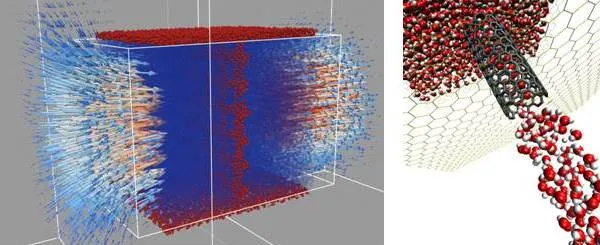Date: June 20-21, 2016
Location:
Institute for Advanced Study, Technical University of Munich
Faculty Club (4th floor)
Lichtenbergstraße 2 a
85748 Garching, Germany
Organization:
- George Biros, University of Texas at Austin, TUM-IAS Hans Fischer Fellow
- Philipp Neumann, TUM
- Jens Harting, Helmholtz Institute Erlangen-Nürnberg/ TU Eindhoven
- Jason Reese, University of Edinburgh
Contact:
Philipp Neumann via neumanph(at)in.tum.de
Contents of the Workshop:
Hybrid/multiscale simulation methods represent a compromise between extremely high molecular resolution and affordable computational cost and are used in various applications, including slip prediction, nanoscale fluid flow, or polymer motion.
In this workshop, we strive for a focused collaboration and exchange between researchers from physics, computer science and engineering to ensure codesign for hybrid flow simulation models, algorithms and software.
The goals of this interdisciplinary workshop comprise a review of achievements in each sub-discipline, discussion of potential challenges and pointing out ways how to resolve them at this early stage.
Points to be addressed comprise:
- Physics: What hybrid simulation model approaches are available nowadays? What can be expected for coupling schemes in future? What are potential issues/limitations? How will the optimal hybrid models translate into algorithms and software?
- Computer Science: What would software design for hybrid simulations (at this early stage) look like? Which kinds of algorithms can we cope with efficiently? How about HPC aspects (e.g., heterogeneous architectures and expected scaling behavior)?
- Engineering: What tools do we need? Which scenarios are of interest now and in future? What can/can't we already simulate and predict? What are the bottlenecks and limitations from the application's point of view?
Invited Plenary Speakers:
- Nikolaus Adams, Technical University of Munich
- Rafael Delgado Buscalioni, Universidad Autonóma de Madrid
- Dimitris Drikakis, University of Strathclyde
- Sergey Karabasov, Queen Mary University of London
- Kurt Kremer, Max Planck Institute for Polymer Research
- Duncan Lockerby, University of Warwick
Program:
Please click here.
Structure:
On day 1, invited speakers who have long-standing expertise in the sub-fields and in interdisciplinary collaborations present the state-of-the-art and recent developments in the field of hybrid simulation methods. There will further be a short introduction round in which all participants present themselves (1 slide/2min. per participant). In the later afternoon, a poster session is planned.
Day 2 continues with further presentations, open and plenary discussions to determine issues in and at the interplay of physics, computer science and engineering and to identify future, potentially interdisciplinary work and research directions.
Registration and Funding:
The number of participants is limited (ca. 25 participants). For more details on registration and potential funding support as well as to register for the workshop, please click here.
We thank the TUM-IAS for the support in organizing the workshop. We further acknowledge the priority program "1648 Software for Exascale Computing" for financial support.
